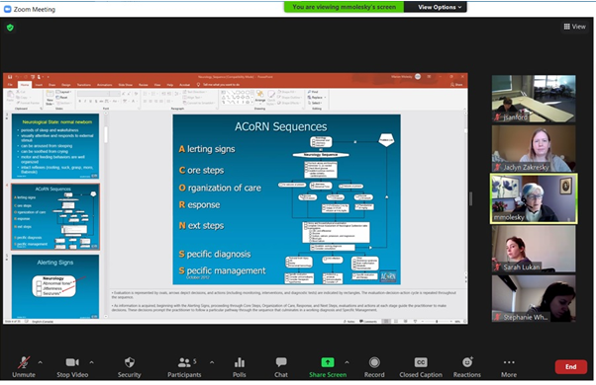Now, thanks to a recent on-line course, at-risk newborns in Northen Alberta will have a greater chance to grow up strong and healthy.
Ten clinical nurse educators from Alberta Health Services (AHS) North Zone participated in the Acute Care of at-Risk Newborns (ACoRN) Course, which is designed to meet the needs of practitioners who may be faced with an at-risk or ill baby.

ACoRN is a valuable resource for rural health professionals who are looking to add to the newborn resuscitation skills they learn through the Neonatal Resuscitation Program (NRP).
Infants require more care and further stabilization after being resuscitated, usually while awaiting transport to another facility for specialist treatment.
Being able to provide appropriate stabilization care can be a source of concern for many health professionals. ACoRN helps medical staff to bridge the gap between the resuscitation of infants and when they are picked up by a specially-trained team for transport to a Neonatal Intensive Care Unit.
RhPAP’s Financial Incentive for Rural Staff Training (FIRST) Program provided funding to Peace River organizers to host two one-day training sessions, which were held virtually on two Fridays in January.
“We see a lot of babies at our site who would benefit from this systematic approach to care and stabilization while waiting for the [Neonatal Intensive Care Unit] transport team.” -Jaclyn Zakresky, clinical nurse educator
According to event organizer, Jaclyn Zakresky, herself a clinical nurse educator and registered nurse, the end goal of the course was to ensure the participants are able to understand the processes to care for an at-risk baby and able to effectively share that information with their colleagues in the future.
Zakresky was thankful for the opportunity to participate in the course and to become more familiar with the process for dealing with at-risk babies.
“We see a lot of babies at our site who would benefit from this systematic approach to care and stabilization while waiting for the [Neonatal Intensive Care Unit] transport team,” she explained.
“I am excited to start teaching staff and physicians all about the ACoRN process, algorithms, and how to effectively use it.”
“AcoRN is an invaluable resource and learning tool for newborn stabilization, especially for rural health-care professionals,” added Jackie Sanford, a clinical nurse educator, who commended Marion Molesky, the course instructor and a nurse practitioner, for promoting awareness of the complex management issues involved in caring for at-risk newborns.
“I will be encouraging health-care professionals that have current [Neonatal Resuscitation Program] certification and are assigned to treat unwell and at-risk newborns, to enhance their skills through the ACoRN Program.”
Once certified, these educators will also have the knowledge to teach the ACoRN Course to other health professionals in the north, who will then provide the course to their rural front-line colleagues.
Is there training that would benefit your rural health-care team, but no other program provides funding for it?
Each year, RhPAP offers up to four rural Alberta communities as much as $5,000 to host a local training event through the Financial Incentive for Rural Staff Training (FIRST) Program. The FIRST Program was developed to enable rural health professionals to have access to innovative and collaborative education opportunities that are not already funded elsewhere. Through this program, rural, multi-disciplinary teams can bring team leadership, communication, continuing professional development and medical education, or practice management training sessions to their own communities.
